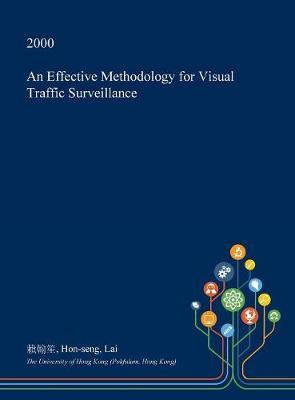Overview
This dissertation, An Effective Methodology for Visual Traffic Surveillance by 賴翰笙, Hon-seng, Lai, was obtained from The University of Hong Kong (Pokfulam, Hong Kong) and is being sold pursuant to Creative Commons: Attribution 3.0 Hong Kong License. The content of this dissertation has not been altered in any way. We have altered the formatting in order to facilitate the ease of printing and reading of the dissertation. All rights not granted by the above license are retained by the author. Abstract: Abstract of thesis entitled An Effective Methodology for Visual Traffic Surveillance submitted by LAI Hon Seng for the degree of Doctor of Philosophy at the University of Hong Kong in January 2000 This thesis presents a methodology for Automatic Visual Traffic Surveillance. The methodology has been developed upon the concept of Unconstrained Detection Regions, which enables it to perform multiple vehicle detection, tracking and traffic parameter estimation in real time. The goal of this research was to develop a suitable methodology for automatic visual traffic surveillance to perform multiple vehicle detection, tracking and traffic parameter estimation in real time as well as being able to tackle scene changes automatically, and detect and handle vehicle occlusion. The proposed methodology is able to first, tackle unpredictable outdoor environment changes, noises, camera actions and vibration automatically based on several novel algorithms. Second, detect vehicle occlusion by monitoring the changes in vehicle model dimensions and handle occlusion using a novel algorithm, so that vehicle can be tracked individually. Third, estimate traffic parameters of individual vehicles or road conditions. Fourth, achieve real time response by employing efficient algorithm to reduce the computation requirement. It has been tested on a number of freeway surveillance image sequences and has shown to be successful in performing the above correctly.In essence, the methodology employs a modular architecture, which consists of four modules: (1) feature preserving noise filtering; (2) vehicle extraction; (3) vehicle tracking; and (4) traffic information estimation, each of which was studied and novel algorithms were proposed to tackle their respective problems. Specifically, to remove noise in digital images and to minimize the feature degradation, a feature preserving noise filtering method has been developed. In it, pixels are classified into either corrupted or uncorrupted and only those corrupted pixels are filtered. Our evaluation has shown that the new method can remove noise effectively, preserve image features, has faster processing speed and can be applied iteratively. In vehicle extraction, a background subtraction approach has been considered, from which, vehicles are extracted by subtracting a stationary background from the image sequence. A scoreboard-based background estimation method has been developed to record the variation of each pixel for selecting different estimation algorithms. Our evaluation has shown that it is fast and accurate. From the background, road parameters are extracted automatically using an edge-based approach in conjunction with two edge discrimination heuristics to determine the road lanes, centerline and lane direction. Our evaluation indicated that it is fast, automatic and can work with straight roads with multiple lanes. Complex vehicle occlusion that appears in visual surveillance is tackled by a generalized deformable modeling method and a vehicle occlusion detection and handling method. In principle, a vehicle is fitted by a 2D projection of a 3D cuboid wire frame with parameterized vertices. By monitoring the changes in the model dimensions and its Area ratio, occlusion is detected successfully every time, and the trajectory is deduced. When occlusion occurs, vehicles are tracked separately byreplicating the vehicle trajectory or splitting the occluded vehicle model. Trials on real-w
Full Product Details
Author: 賴翰笙 ,
Hon-Seng Lai
Publisher: Open Dissertation Press
Imprint: Open Dissertation Press
Dimensions:
Width: 21.60cm
, Height: 1.90cm
, Length: 27.90cm
Weight: 1.007kg
ISBN: 9781374724068
ISBN 10: 1374724068
Publication Date: 27 January 2017
Audience:
General/trade
,
General
Format: Hardback
Publisher's Status: Active
Availability: Temporarily unavailable

The supplier advises that this item is temporarily unavailable. It will be ordered for you and placed on backorder. Once it does come back in stock, we will ship it out to you.



